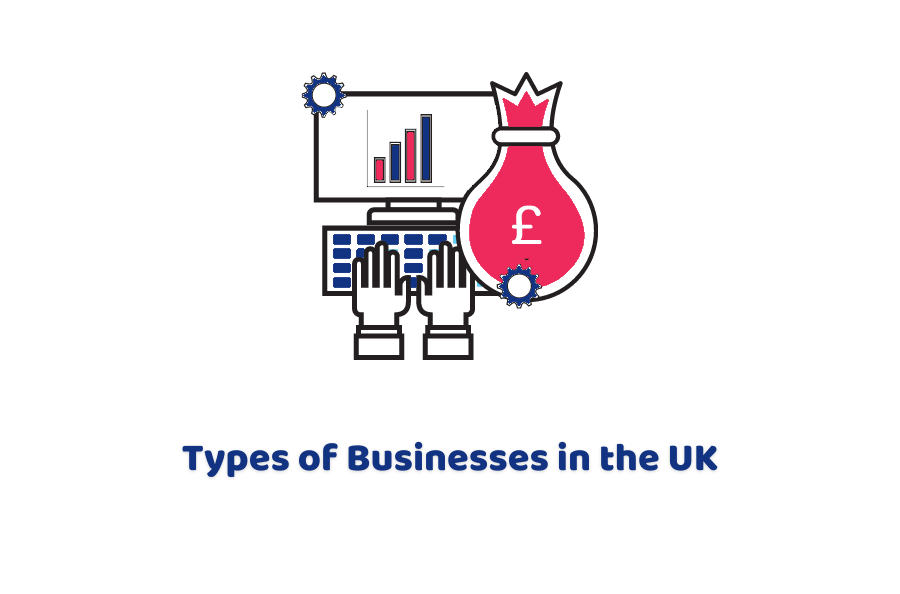Before jumping into the business world, you need to understand the different types of business and choose one that suits you. There are many business structures to choose from, so you need to do your research beforehand to be legally compliant. And to be saved from the hassle of legal complications and most importantly to avoid extra taxes and penalties.
Let’s kick off with the most common types of business in the UK.
Want to be your own boss? We will help you to register your business right away. Get in touch with us now!
Types of Business
You need to understand that every business operates in different ways. In fact, each business has different paperwork, taxes, profit distribution techniques and personal responsibilities.
Here are the most common business types in the UK:
1) Sole Trader
There are almost 3.5 million sole traders in the UK making 59% of the total UK’s private sector business population. A sole trader is the only owner of a business who is solely responsible for business profits and losses. The sole trader can keep all the profit after deducting the tax. One can easily register as a sole trader by informing HMRC about the status. Here the business and the business owner is considered a single entity.
2) Partnership
According to 2020 statistics, there are around 414,000 businesses registered as a partnership in the UK. The partnership is similar to sole-proprietorship but here two or more individuals are the business owners. They agree to share the profit and loss at determined rates. The partners share the risks, losses, gains and responsibilities of running a business. Each person is responsible to pay tax on the share of profit.
3) Public Limited Company
As the name suggests, the public limited company is owned by the public. Anyone can get a share of it. It is a corporation where individual equity is separate from that of the company. A private limited company needs to have at least £50,000 of allotted shares, which are also known as the authorised minimum.
4) Private Company Limited by Shares (LTD)
A private company is not owned by the public rather it is owned by non-government organisations or some number of shareholders. Similar to PLC, the private company contains a limited financial share of the individual. This sum is based on the amount of investment made by a person of LTD.
Establish your business with Accounting firms. Contact now!
5) Company Limited by Guarantee (CLG)
A CLG is different from PLC’s and LTD companies. Here an individual who has invested in this company is not liable for a fixed sum. The members of these companies are known as the company’s guarantors. These companies should have Limited in their name but there are exceptions for the companies that don’t distribute profit to their members.
6) Unlimited Company (Unltd)
It is a type of private company that needs to be registered with Companies House. Its members are its shareholder and directors and they have unlimited liability. This means every individual is responsible for the debts of the company if it goes insolvent. If its debts and liabilities are not met, the shareholders and directors contribute to make up the shortfall.
7) Limited Liability Partnership (LLP)
The LLP is treated as the incorporated body. The partners in LLP have limited liabilities. They’re responsible only for their personal negligence not for the company. Here the partners manage the business.
8) Community Interest Company (CIC)
If a company is not aimed at maximising the profit for the shareholders it is called a community interest company. This company works for the welfare of the local community. It is easy to set up and the shareholders usually don’t get the profit.
9) Royal Charter (RC)
It is the old form of incorporation in the UK. In olden times all companies need approval from the royal charter but now it has become an outdated method. A company created by the royal charter has specific power granted by the monarch. Organizations like Opera House, Bank of England and BBC are known as chartered organizations.
Quick Sum Up
Hopefully, you have got enough information about the types of business structures in the UK. If you are going to start your own business, you need to take expert advice to get a deep insight into the types of businesses. As without having sufficient information on the type of business structure you may face a lot of legal and tax issues in the future.
Accounting firms have brought all the accounting businesses together on a single platform. Register Today!
Disclaimer: This blog is intended for your general information on the types of businesses.

